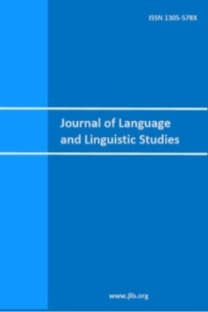Türk İngilizce Öğretmenlerinin Kemikleşmiş Bir Sesletim Sorunu: // ve /
/ Sesbirimlerinin Karşılaştırılmasıolay için asl neden bu iki sesbirimin de çağdaş Türkçede var olmamasıdır. Diğer bir neden ise, // sesbiriminin dilbilgisel süreçlerden geçerek seslemlerde vurgu değişikliğinin de yardımıyla, // sesbirimine indirgenmesidir. Örneğin, milk man, post man ve gate man birer sözcük öbekleridir, ama birleşik sözcük olma süreci içinde, birincil vurguyu yitirerek // sesbiriminin // sesbirimi düzeyine indirgenmesiyle, man gibi bir bağımsız sözcük artık bağımlı bir sözcük konumuna düşer ve hep zayıf vurguyu üsüne çeker. Bu makalede, Türk İngilizce öğretmenlerinin kafasını karıştıran bu sesletim olayı ele alınacak ve bir örnek ders planı uygulanmasıyla bu sesletim güçlüğü çözülmeye çalışılacaktır
Anahtar Kelimeler:
sesbirimsel indirgeme, ash (kelebek a), schwa, kemikleşmiş hata ve vurgu hareketliliği
The / æ / and / ǝ / Contrast as a Case of Fossilized Pronunciation Error for Turkish English Teachers
The [æ], called “ash” and [ ǝ ], called “schwa” are very frequent phonemes in English language that confuse the Turkish teachers of English. The main reason for this confusion is that both of them do not exist in modern standard Turkish. Another reason is the reduction of [æ] into [ǝ] in word formation process with the accompaniment of the change of primary stress to another syllable. For example, milk mán, post mán, and gate mán are phrases by nature, but in a process of compounding they take the morphological form of milkmǎn, póstmǎn, and gátemǎn through a phonological decay of the / æ / phoneme into / ǝ / phoneme with the reduction of the primary stress of the free word mán into the weak stress form like -mǎn, relegating it into the position of a bound morpheme. This article, through a model lesson plan, will explore such sound changes that confuse the Turkish English teachers.
- ISSN: 1305-578X
- Yayın Aralığı: Yılda 4 Sayı
- Yayıncı: Hacettepe Üniversitesi
Sayıdaki Diğer Makaleler
The Contributions of Theme-Based CBI to Turkish Young Learners' Language Development in English
Nalân KIZILTAN, Ceylan ERSANLI
Run-on and Stringy Sentences in Writing
Acquisition of Latin Roots with Implications for EAP
Buğra Zengin, Ali Doğan, Suna Akalın
Negotiating the Meaning of Grammatical Constructions With Some English Confusables
Türkiye’de Halkın Yabancı Dil İle İlgili Algıları
Türk İngilizce Öğretmenlerinin Kemikleşmiş Bir Sesletim Sorunu: // ve /
The Eastern Origin of English Words
Patterns of Idiomacity in English, Italian and Romanian
